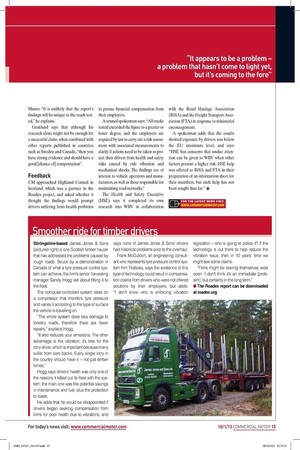Stirlingshire-based James Jones & Sons (pictured r
Page 11

If you've noticed an error in this article please click here to report it so we can fix it.
Stirlingshire-based James Jones & Sons (pictured right) is one Scottish timber haulier that has addressed the problems caused by rough roads. Struck by a demonstration in Canada of what a tyre pressure control system can achieve, the firm's senior harvesting manager Sandy Hogg set about fitting it to the fleet.
The computer-controlled system relies on a compressor that monitors tyre pressure and varies it according to the type of surface the vehicle is travelling on.
"The whole system does less damage to forestry roads, therefore there are fewer repairs," explains Hogg.
"It also reduces your emissions. The other advantage is the vibration; it's less for the lorry driver, which is important because many suffer from sore backs. Every single lorry in the country should have it — not just timber lorries."
Hogg says drivers' health was only one of the reasons it kitted out its fleet with the system: the main one was the potential savings in maintenance and fuel, plus the protection to roads.
He adds that he would be disappointed if drivers began seeking compensation from firms for poor health due to vibrations, and says none of James Jones & Sons' drivers had historical problems prior to the overhaul.
Frank McCulloch, an engineering consultant who represents tyre pressure control system firm Tireboss, says the existence of this type of technology could result in compensation claims from drivers who were not offered solutions by their employers, but adds: "I don't know who is enforcing vibration legislation — who is going to police it? If the technology is out there to help reduce the vibration issue, then in 10 years' time we might see some claims.
"Firms might be leaving themselves wide open. I don't think it's an immediate [problem], but certainly in the long term."
• The Roadex report can be downloaded at roadex.org









































